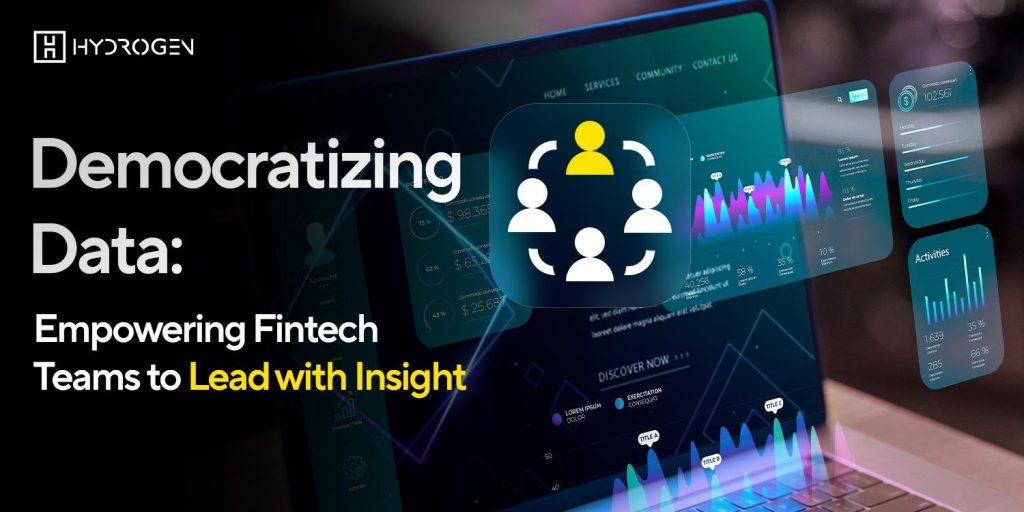Democratizing Data: Empowering FinTech Teams to Lead with Insight

By David Adejumo, Data Analytics Engineer, Hydrogen
A Story of Transformation: When Everyone Sees the Numbers
In a busy support centre, an agent notices a troubling uptick in failed transactions across a particular merchant segment. Rather than escalating without context, she pulls up a dashboard, isolates the issue, and alerts the operations team with specifics. In another office, a product manager is tracing drop-off rates in a recently launched feature, and what she finds in the data reshapes the next sprint. On the road, a field officer reroutes installation visits based on live fault trends, covering more ground with fewer delays.
These actions share a common thread: data access without dependency. In the past, these teams would wait days for reports, if they received them at all. Today, they see the numbers themselves. They act on them. They improve outcomes. At Hydrogen, this shift is deliberate. Data is no longer locked in reports or behind technical teams. It is part of how we operate daily, collaboratively, and company-wide.
Why Data Access Matters in Nigerian FinTech
Nigeria’s digital economy is expanding rapidly. In 2024, electronic transactions hit ₦1.07 quadrillion, up 79.6% from ₦600 trillion in 2023 (NIBSS). Mobile-based payments surged as well, reaching ₦159.4 trillion in H1 2024, reflecting both a shift in behaviour and rising merchant reliance on digital tools. Yet only 34% of Nigerian adults have ever made a digital payment (World Bank), a clear signal that digital enablement alone is not enough.
Globally, FinTech teams are using data at operational speed. A McKinsey study reports that over 60% of high-performing FinTechs rely on real-time customer data to improve issue resolution and personalize service. In operations, data is used to proactively resolve up to 30% more issues through analytics on transaction patterns, device uptime, and infrastructure triggers (BCG).
Across Africa, data systems are increasingly embedded into frontline roles. According to the GSMA Mobile Money Report 2023, support agents and field teams now use real-time dashboards and automated workflows, resulting in up to 40% faster resolution times and 25% fewer escalations.
In Nigerian FinTechs:
- CX and Support teams access data dashboards 4–6 times per shift, using ticketing insights and customer journey analytics to prioritize urgent cases and reduce average handling time (Hydrogen internal data, 2025).
- Operations teams rely on compliance alerts, failed transaction patterns, and infrastructure logs, analysing data hourly to maintain uptime SLAs above 99% (EY Africa FinTech Insight).
- Marketing teams use behavioural analytics and A/B testing data daily, with some running 100+ micro-campaigns monthly, drawing from segmentation tools and real-time engagement data (GeoPoll Africa Insights).
- Product teams embed telemetry tools that track feature usage in real time, with daily stand-ups anchored on dashboards to monitor drop-offs, adoption rates, and system latency (Product-led Growth Africa, 2024).
FinTech companies must ensure that insight is not centralized, it is distributed. The ability to understand, interpret, and act on data must exist across support, product, operations, and field teams and must happen daily, not by escalation.
This is the foundation for Hydrogen’s approach to building a modern, agile FinTech company.
How Non-Technical Teams Use Data to Deliver Impact
Customer Support: Turning Insight into Faster Resolution
Customer support is often the first to sense when something is wrong. But without data, they are reactive. With access to live dashboards, Hydrogen’s agents can:
- Identify complaint patterns by region, merchant tier, or terminal type, enabling pre-emptive action.
- Escalate recurring issues with historical data and trend reports that support root-cause identification.
- Provide merchants with evidence-based responses, drawing from transaction logs and terminal history.
This transition builds merchant confidence, reduces friction, and drives faster problem resolution.
Product Management: Prioritizing Based on Proof, Not Assumption
At Hydrogen, product managers do not guess; they test. With direct access to behavioural analytics and merchant feedback loops, PMs are able to:
- Track feature adoption and usage metrics to validate real-world engagement.
- Prioritize roadmap items based on actual business impact and merchant demand.
- Define success metrics and monitor KPIs across releases, enabling faster iteration.
This ensures product decisions are grounded in merchant needs, not internal assumptions.
Operations: Diagnosing and Acting on Real-Time Signals
Operations teams depend on visibility. Instead of relying solely on post-incident reviews, our teams use real-time data to:
- Monitor terminal uptime, transaction volumes, and device health across geographies.
- Track settlement cycles, delays, and reconciliation timelines to identify process lags.
- Resolve systemic issues by tracing incident data back to infrastructure or vendor root causes.
This visibility strengthens operational resilience and ensures a consistently better merchant experience.
Field Support Officers: Planning Smarter, Resolving Faster
Field officers at Hydrogen support thousands of terminals in motion. With data in hand, they can:
- Optimize routing based on real-time support ticket clustering and terminal activity.
- Measure productivity through metrics like average resolution time and visit efficiency.
- Reduce repeat visits by understanding device history before deployment.
Empowered with relevant insights, field teams become more strategic, accountable, and efficient.
What It Takes to Build a Data-Driven Culture
Democratizing data is not about giving everyone a login to a BI tool; it is about creating a system where data becomes second nature. At Hydrogen, we focus on four pillars:
1. Role-Specific Dashboards
Dashboards are tailored to team needs. A field officer sees active deployments. A support agent sees complaint trends. A PM sees feature usage. Each dashboard is built to fit workflows and not disrupt them.
2. Continuous Training for Insight Fluency
From onboarding to quarterly refreshers, team members are trained on how to read trends, interpret anomalies, and ask data-informed questions regardless of their technical background.
3. Automated Insight Reporting
Our weekly reports are not static. They summarize key shifts, explain patterns, and suggest actions. This ensures decisions are made using current, clear, and shared intelligence.
4. Department-Owned Metrics
Every team sets its own KPIs aligned with company goals. This fosters accountability and gives each function ownership of their data story from merchant satisfaction to operational efficiency.
This structure transforms insight into an everyday tool, not a specialist’s luxury.

The Path Forward: Insight at the Speed of FinTech
The future of FinTech will not be built by the fastest team. It will be built by the clearest. At Hydrogen, we have learned that when every team member, regardless of technical background, is empowered to work with data, the business moves not just faster but smarter.
The real competitive edge is not just having data; it is using it. Daily. Directly. Decisively.
A Final Word
If data lives only in dashboards that no one opens, it changes nothing. But when data becomes part of a team’s everyday rhythm, checked in the morning, used in a meeting, applied in a sprint, then transformation happens.
This is not about giving everyone charts. It is about giving every team the confidence to trust their insights, adapt their strategies, and lead with clarity.
Because the future of FinTech belongs to teams who do not just move fast, they move informed.
 Transacting at the speed of light
Transacting at the speed of light 